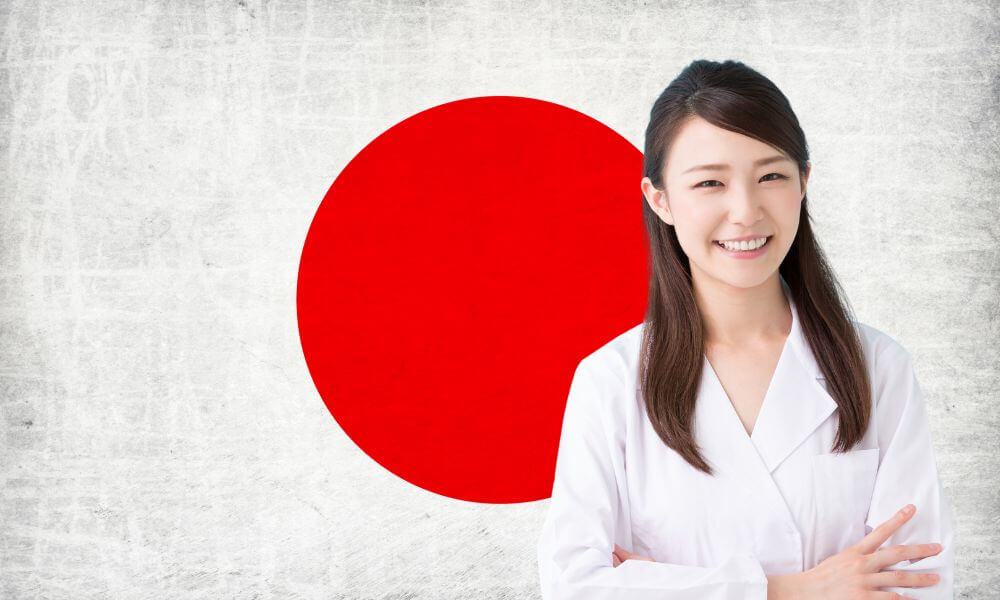Japanese is the most common language in Japan with around 99% of the population speaking it as their first language. The Rukyuan languages, also part of the same family, are spoken in Okinawa as well as in Kagoshima in the islands of Ryukyu. There are other indigenous languages like Ainu spoken by the Ainu people.
Japan is hardly a polyglot nation, but it’s also not a linguistic monolith, either.
The overwhelming majority of people in Japan speak Japanese, of which there are a few different dialects.
But Japan is a large and densely populated country, meaning a language spoken by even a small minority of people may still be spoken by a great many individuals.
Let’s find out more.

[adinserter block=”6″]
What is the main language in Japan?

The main language of Japan, unsurprisingly, is Japanese.
This language is spoken by around 128 million people as a native language, and this is almost entirely in Japan—the only country where Japanese is a national language.
Japanese is part of the Japonic language family, also called the Japanese Ryukyuan languages.
Attempts to group this language family up with wider families, such as Koreanic and Ainu, have not gained scholarly acceptance.
Though the language has many speakers, it is fairly isolated in terms of its broader family.
Not much is known about the language’s earliest history. Chinese texts record Japanese words as early as the 3rd Century AD, but there are no substantial texts in Japanese until around the 8th Century.
The language is thus divided into Old Japanese, Early Middle Japanese, Late Middle Japanese, and Early Modern Japanese.
In the modern form of the language, loan words have become a lot more common.
So, today, around 99.2% of all people in Japan speak Japanese as their first language.
This doesn’t leave much room for other languages, but given Japan’s fairly large population of around 125 million, there are still around 1 million people in Japan and its neighbouring islands who speak a different native language as their first language.
Most, however, also know Japanese.
There are multiple Japanese dialects, too.
These fall into two main categories: the Eastern dialects, which includes the Tokyo dialect that is considered the standard form of Japanese, and western dialects, used in Kyoto and Osaka.
The dialects of Kyushu and Hachijo Island are also sometimes considered to be distinct dialects of their own.
Some of the other natively spoken languages in Japan are sometimes referred to as Japanese dialects, though strict linguistic classification would not agree with this.
What other languages are spoken in Japan, then?
What other languages are spoken in Japan?

Besides Japanese, the other most common languages in Japan are the Ryukyuan languages, spoken primarily in Okinawa but also in parts of Kagoshima.
These languages, also known as Lewchewan or Luchuan, are the indigenous languages of the Ryukyu islands, at the southernmost part of the Japanese archipelago.
UNESCO lists all the Ryukyu languages as endangered today, as they are largely falling out of use as there is a shift toward the use of standard Japanese in the islands.
Japanese is not mutually intelligible with these languages, though they are part of the same family.
There are many of these languages, divided into the Northern and Southern groups.
These include Amami languages such as Kikai and Omami Oshima in the north, and Miyakoan languages such as Central Miyako and Irabu in the south.
Okinawan is by far the language with the most speakers, at about 980,000.
In the northern Japanese island of Hokkaido, the Ainu language still clings on by a thread and is spoken by island elders.
The language is nearly extinct, and as of 2018 there are a recorded less than five people who understand the language.
Based on current trends, the language will not be spoken by anyone very soon, though Japan still took the decision to recognize it as an official language in 2008.
Is English widely spoken in Japan?

English is fairly widely spoken in Japan as a second language.
It is an international language that is used for business and communications, as well as for government summits like the UN.
So, many in Japan know and understand English for the purposes of work or travel.
As a general rule of thumb, you’re more likely to meet English speaking Japanese people in denser urban areas like Tokyo.
The further you go out into the country, the less likely you are to meet English speaking Japanese people.
Is it difficult to learn Japanese?

For an English speaker, Japanese is considered very difficult to learn.
It is so far removed from English that you’ll recognize virtually nothing about it, not to mention the fact you will need to learn an entirely new alphabet with three separate writing systems.
The sentence structure is entirely opposite to how it is in English which often confuses people, not to mention the careful social and interpersonal hierarchies of politeness that you’ll need to get to grips with.
Japanese may be the most commonly spoken language in a country of 125 million people, but they learned it from birth—you don’t have that advantage!
You may not be surprised, then, that the main language of Japan is Japanese.
Japan is often erroneously touted as an example of a monolithic, single-ethnicity state, but this is simply false.
The vast majority of people speak Japanese as their first language, but there are vibrant and large communities of native people who speak many other languages.
[adinserter block=”6″]
More in Regional Languages
- What Languages Are Spoken In Afghanistan?
- What Languages Are Spoken In Africa?
- What Languages Are Spoken In Albania?
- What Languages Are Spoken In America?
- What Languages Are Spoken In Antwerp?
- What Languages Are Spoken In Argentina?
- What Languages Are Spoken In Australia?
- What Languages Are Spoken In Austria?
- What Languages Are Spoken In Bangladesh?
- What Languages Are Spoken In Barcelona?
- What Languages Are Spoken In Belgium?
- What Languages Are Spoken In Bolivia?
- What Languages Are Spoken In Bosnia?
- What Languages Are Spoken In Brazil?
- What Languages Are Spoken In Budapest?
- What Languages Are Spoken In China?
- What Languages Are Spoken In Colombia?
- What Languages Are Spoken In Croatia?
- What Languages Are Spoken In Cuba?
- What Languages Are Spoken In Cyprus?
- What Languages Are Spoken In Denmark?
- What Languages Are Spoken In Djibouti?
- What Languages Are Spoken In Ecuador?
- What Languages Are Spoken In Egypt?
- What Languages Are Spoken In El Salvador?
- What Languages Are Spoken In England?
- What Languages Are Spoken In Eritrea?
- What Languages Are Spoken In Estonia?
- What Languages Are Spoken In Ethiopia?
- What Languages Are Spoken In Fiji?
- What Languages Are Spoken In Finland?
- What Languages Are Spoken In Germany?
- What Languages Are Spoken In Japan?
- What Languages Are Spoken In Morocco?
- What Languages Are Spoken In South Africa?

